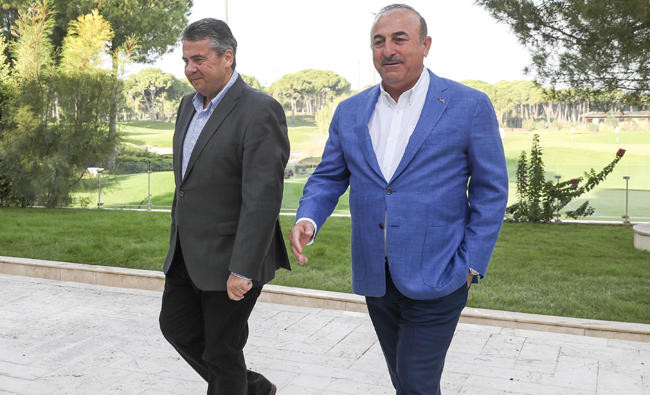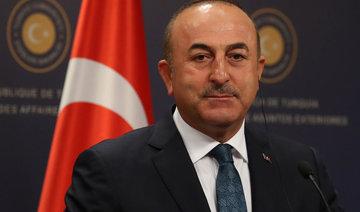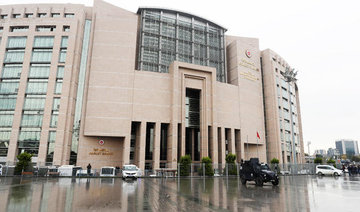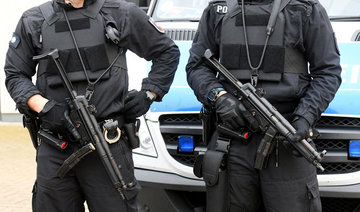ANKARA: With relations between their countries at an all-time low in the run-up to Germany’s September elections, Turkish Foreign Minister Mevlut Cavusoglu and his German counterpart Sigmar Gabriel held a long-awaited one-to-one meeting on Nov. 4 in Turkey’s southern resort province of Antalya.
“I met my colleague Sigmar Gabriel informally to discuss bilateral relations; including the difficult issues and mutual expectations,” Cavusoglu tweeted after the meeting.
On Sunday, Turkish presidential spokesperson Ibrahim Kalin told Turkish news channel NTV that Turkey is seeking good relations with Germany because “it is one of the most important countries of the EU.”
Kalin added that the arrests made Saturday during a pro-PKK (Kurdistan Worker’s Party) rally in Dusseldorf were “a good but insufficient step. The German government needs to take more steps on counterterrorism.”
The outlawed PKK, considered a terrorist group by Turkey, the US and the EU, has also been banned in Germany since 1993.
The main disagreements between Turkey and Germany center on Ankara’s accusing Berlin of tolerating the outlawed PKK members and their activities in its territories and of granting asylum to the Gulenists following the failed coup attempt last year.
Instead, Germany criticizes Turkey for arresting German nationals, including journalists and rights activists, without offering legitimate reasons.
Turkey recently released a German national, Peter Steudtner, who was accused of terror charges, as well as another German whose name has not been disclosed, and these have widely been seen as positive steps taken by Ankara to restore ties and dampen the crisis.
“Many were expecting that the German modus operandi toward Turkey would change after the elections — if Ankara would meet some of Berlin’s most pressing demands,” Magdalena Kirchner, Mercator-IPC fellow at the Istanbul Policy Center, told Arab News.
“The visit is a clear signal that the German government appreciated that, as Gabriel had said himself, ‘the Turkish government has kept all its promises’ regarding the release of Peter Steudtner in late October,” she added.
But, according to Kirchner, as about a dozen other German citizens are still detained in Turkey on terrorism-related and other charges, Cavusoglu and Gabriel might have looked at how to move on from this first successful step.
“Also for Ankara, maintaining a permanent dialogue despite ongoing coalition negotiations in Berlin and uncertainty over their exact outcome, is of high importance in terms of economic and security cooperation,” Kirchner noted.
“In order to revive at least a dialogue about the modernization of the EU customs union and reach a minimum of consensus on terrorism issues with Western partners, Berlin remains key for Ankara’s foreign policy. Therefore, it was also important that the meeting was aimed at reassessing bilateral relations beyond the case of German detainees.”
For Kirchner, the termination of election campaigning in Germany and the forthcoming end of Gabriel’s term as foreign minister — as soon as a new coalition government is formed in Berlin — have also helped to foster a better relationship between the two countries.
“Hence, he can take on to a certain extent the role of an ‘elder statesman,’ setting a more reconciliatory tone and preventing an all-too-bumpy start for the incoming government,” she noted.
During the election campaign, Gabriel had advocated against breaking off membership talks with Turkey, and reminded that Ankara was a key neighbor and a partner in the NATO alliance who could otherwise side with Russia.
Although denied by Ankara, Gabriel last month thanked former German Chancellor Gerhard Schroeder, who still maintains close contact with Turkish President Recep Tayyip Erdogan, for mediating for the release of German citizens detained in Turkey.
“While we certainly see a de-escalation of the tension between Germany and Turkey, this is not a sign of a return to the status quo ante as most of the problems that caused the crises are not addressed,” Ozgur Unluhisarcikli, who heads the German Marshall Fund in Ankara, told Arab News.
On the other hand, Unluhisarcikli says, Germany will probably refrain from doing everything it had talked about earlier primarily because some of these measures, such as suspending EU accession negotiations with Turkey, are not supported by a critical mass of EU member states.
“The Germany-Turkey relationship is structurally very resilient and will eventually normalize. Both countries could accelerate this process by addressing each other’s legitimate concerns sooner rather than later,” he added.
Turkey and Germany take steps to restore ties
Turkey and Germany take steps to restore ties

Israel strikes south Lebanon, Aoun holds urgent talks to halt attacks

- Hezbollah field commander killed, civilians injured in 19 airstrikes across Nabatieh area
- Nawaf Salam condemned the Israeli strikes on Nabatieh and said the government was aiming to ‘put an end to the Israeli violations as soon as possible’
BEIRUT: Israel conducted heavy airstrikes in south Lebanon on Thursday, hitting targets north of the Litani River in violation of a US-brokered truce.
Following the strikes in the Nabatieh region, Lebanese President Joseph Aoun held urgent talks with high-level foreign contacts to halt the Israeli violations.
The airstrikes killed one person, reportedly a senior Hezbollah military leader, and led to multiple injuries, sparking panic in schools, universities and among residents.
Aoun followed up on security developments with army chief Gen. Rodolphe Haikal, receiving reports on the areas struck by the Israeli bombardment.
The Ministry of Health said that the initial death toll of the Israeli airstrikes on the outskirts of Nabatieh was one, with eight injured.
A source familiar with Aoun’s communications told Arab News: “The president’s contacts primarily involved the US and French sides, as they are sponsors of the ceasefire agreement and key members of the committee overseeing its implementation.”
The president reportedly called on the US and France “to pressure Israel to halt its attacks,” but the talks “did not yield any concrete guarantees.”
Israeli jets launched about 19 airstrikes on the area between Kfar Tebnit, Jabal Ali Taher, Nabatieh Al-Fawqa and Kafr Rumman, forming what resembled a ring of fire.
Containing valleys, hills and forests, the area is located about 4 km from the city of Nabatieh, which itself is 56 km from Beirut.
The unprecedented Israeli attack on the region, untouched since the ceasefire agreement between Israel and Hezbollah took effect on Nov. 27, specifically targeted the Ali Taher area, considered a Hezbollah-controlled security zone.
Hezbollah reportedly lost one of its top military commanders, Abu Hussein Shahrour, who, according to reporters in the region, “was one of the party’s key fighters and played a pivotal role in the 1997 Sajd operation against the Israeli occupation.”
According to Israeli media, a “senior source” in the Israeli army said the military “attacked a significant target in southern Lebanon, consisting of underground infrastructure.”
Israeli army spokesperson Avichay Adraee said the target “was used to manage the fire and defense systems of the Hezbollah terrorist organization.”
According to Adraee, the airstrikes “targeted personnel, combat equipment and wells. The site in question was part of a strategic underground project and was put out of service as a result of the strikes.”
He added that “the site and activities there are a blatant violation of the understanding between Israel and Lebanon.”
The Israeli army “will continue to act to eliminate any threat to Israel’s security and will prevent any attempt to rebuild Hezbollah’s capabilities,” Adraee said.
The Israeli army’s Northern Command said it would maintain its “offensive policy” against Hezbollah.
The airstrikes and massive explosions triggered loud bangs that echoed throughout Nabatieh and the south.
Residents near the targeted areas rushed to evacuate their children from schools, and most official departments shut down.
Later, the Israeli army opened fire with machine guns on a civilian vehicle on the Odaisseh-Kafr Kila road in the border area.
The car sustained damage. However, the female driver and her daughter escaped unharmed.
Meanwhile, in the morning, Israeli aircraft dropped leaflets on several areas in the south, resembling banknote-like papers that carried incendiary phrases against Hezbollah. These included: “Hezbollah’s dollar is haram (forbidden in Islam) and will not benefit you after it destroyed your house and displaced your family.”
Another said: “Do not miscalculate things and do not accept the yellow dollar.”
Prime Minister Nawaf Salam condemned the Israeli strikes on Nabatieh and said the government was aiming to “put an end to the Israeli violations as soon as possible.”
He added: “The government has spared no diplomatic effort to stop these actions and ensure Israel’s withdrawal from the hills it still occupies.”
Salam, accompanied by a ministerial delegation, traveled to Baalbek in the morning on a Lebanese army helicopter and inspected the border plains with Syria.
He has repeatedly called for Lebanon to ramp up its border security.
Salam called for strengthened security measures during a security meeting at Baalbek Serail, highlighting the need to “maintain stability and ensure successful municipal elections with complete transparency and integrity” throughout the governorate.
Meeting with local representatives, the premier announced progress on establishing a cannabis regulatory authority, describing it as a pathway “to transition toward a development-based economy benefiting regional residents.”
Salam was unequivocal that “neither security nor development can function through arbitrary measures.”
He highlighted the urgent need to resolve transportation challenges between Beirut and the Bekaa Valley, while advocating for Baalbek’s restoration as a premier tourist destination in Lebanon.
Salam also visited the Masnaa border crossing with Syria, receiving detailed security briefings from military personnel on site.
“The Masnaa crossing serves as a vital gateway for both the Bekaa and Lebanon as a whole. It must operate according to the highest technical and security standards rather than succumbing to disorder or discretionary practices,” Salam said.
He added that advanced scanning equipment would soon be installed “to facilitate goods movement, enhance transparency and enable properly regulated land exports of Lebanese products.”
Salam said that transforming the border crossing “from a vulnerability into a symbol of state effectiveness” represents a critical first step in broader reforms.
“This is where change begins — with Lebanon fully reclaiming control of its borders and converting them into gateways for legitimacy and order, not channels for chaos and violations.”
Released Palestinian student to help launch immigrant legal aid initiative in Vermont

- Mohsen Mahdawi, 34, who led protests against Israel’s war in Gaza at Columbia University, spent 16 days in a state prison
- “We will not fear anyone because our fight is a fight for love, a fight for democracy, a fight for humanity,” Mahdawi told supporters
VERMONT: A Palestinian student arrested during an interview about finalizing his US citizenship is helping to launch an initiative to help other immigrants facing deportation in Vermont on Thursday, a week after a federal judge freed him from custody.
Mohsen Mahdawi, 34, who led protests against Israel’s war in Gaza at Columbia University, spent 16 days in a state prison before a judge ordered him released on April 30. The Trump administration has said Mahdawi should be deported because his activism threatens its foreign policy goals, but the judge ruled that he has raised a “substantial claim” that the government arrested him to stifle speech with which it disagrees.
Immigration authorities have detained college students from around the country since the first days of the Trump administration. Many of them participated in campus protests over the Israel-Hamas war, which has killed more than 52,000 Palestinians. Mahdawi was among the first to win his freedom after challenging his arrest.
“Justice is inevitable. We will not fear anyone because our fight is a fight for love, a fight for democracy, a fight for humanity,” Mahdawi told supporters outside the courthouse last week.
He will join Vermont State Treasurer Mike Pieciak, Senate Majority Leader Kesha Ram Hinsdale and community advocates at the Statehouse to announce the Vermont Immigration Legal Defense Fund. The group, which also includes lawyers and philanthropists, says the goal is to improve access to legal advice for immigrants and build long-term infrastructure within the justice system as it pertains to immigration law.
Members of Vermont’s congressional delegation have spoken up on Mahdawi’s behalf, as have state politicians. Vermont’s House and Senate passed resolutions condemning the circumstances of his detention and advocating for his release and due process rights.
Republican Gov. Phil Scott has said there is no justification for the manner in which Mahdawi was arrested, at an immigration office in Colchester.
“Law enforcement officers in this country should not operate in the shadows or hide behind masks,” the governor said the next day. “The power of the executive branch of the federal government is immense, but it is not infinite, and it is not absolute.”
Mahdawi, a legal permanent resident, was born in a refugee camp in the Israeli-occupied West Bank and moved to the United States in 2014. At Columbia, he organized campus protests and co-founded the Palestinian Student Union with Mahmoud Khalil, another Palestinian permanent resident of the US and graduate student who was arrested in March.
His release, which is being challenged by the government, allows him to travel outside of his home state of Vermont and attend his graduation from Columbia in New York later this month.
UN chief voices ‘grave concern’ after Sudan’s aid hub rocked by 5 days of drone attacks

- Port Sudan is the country’s main entry point for humanitarian aid
- Country’s brutal civil war has killed tens of thousands, displaced millions
NEW YORK CITY: The UN secretary-general has voiced “grave concern” over repeated drone attacks on the eastern Sudanese city of Port Sudan, the country’s main entry point for humanitarian aid.
The city faced a new drone strike on Thursday for the fifth consecutive day amid a fierce confrontation between the Sudanese Armed Forces and Rapid Support Forces paramilitary.
The attacks have led to an exodus of civilians from the city, which hosts UN offices and aid agencies, and is the seat of power of the army-backed government.
Sudanese army officials have blamed the RSF for the strikes, which have targeted the city’s port, largest operational fuel depot, central power station and airport, among other sites.
UN Secretary-General Antonio Guterres warned that the attacks “threaten to increase humanitarian needs and further complicate aid operations in the country,” his spokesman, Stephane Dujarric, said on Wednesday.
“The secretary-general is alarmed at the expansion of the conflict into an area that has served as a place of refuge for large numbers of people displaced from the capital, Khartoum, and other areas,” he added.
Sudan’s brutal two-year-long civil war has killed tens of thousands of people and displaced more than 13 million.
The conflict has created “the biggest humanitarian crisis ever recorded,” the International Rescue Committee has said.
“The secretary-general reiterates that all parties to the conflict must comply with their obligations under international humanitarian law,” Dujarric said.
“They must not direct attacks against civilians and civilian objects; must take all feasible precautions to avoid, and in any event to minimize, incidental civilian casualties; and must allow and facilitate rapid and unimpeded passage of humanitarian relief for civilians in need.”
Almost all humanitarian aid enters the Northeast African country through Port Sudan.
The Chinese Embassy in Sudan on Thursday called on all Chinese citizens to leave the country as soon as possible.
Guterres is “concerned at the lack of political will of the parties to return to the negotiating table, preferring instead to continue pursuing their military objectives,” Wednesday’s statement said.
“The secretary-general calls on the parties to engage constructively with the mediation support mechanisms already in place to assist the parties to reach a political solution, underscoring the UN’s continued support to help find a way out of this crisis.
“He renews his call for an immediate cessation of hostilities and stresses that dialogue is the only way to achieve the peace that the people of Sudan demand.”
Syria believed to make no purchase in 100,000 T wheat tender, traders say

- Traders said Syria could issue a new purchase tender soon
- Shipment was sought within 45 days from the contract award
HAMBURG: A Syrian state grains agency is believed to have made no purchase in an international tender seeking 100,000 metric tons of milling wheat which closed in April, European traders said on Thursday.
Traders said Syria could issue a new purchase tender soon.
Shipment was sought within 45 days from the contract award.
Syria had bought about 100,000 tons of wheat in its previous tender reported on March 25, which was believed to be the first large purchase tender since the change of power in Syria late last year.
But the donation by Iraq of 220,000 tons of wheat to Syria was expected to be used for Syria’s immediate import requirements, traders said.
Chinese embassy in Sudan urges citizens to evacuate amid security concerns

- The embassy warned of dwindling supplies of water, electricity and fuel
BEIJING: The Chinese embassy in Sudan on Thursday issued a statement urging Chinese citizens in the country to evacuate as soon as possible, citing deteriorating security situation and rising security risks.
The embassy warned of dwindling supplies of water, electricity and fuel, and advised citizens to evacuate via ships to Saudi Arabia or available international flights, or to travel by land to Egypt.





















